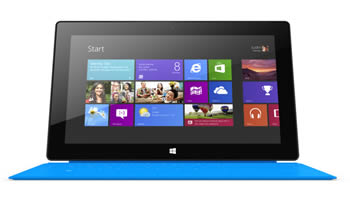Difference between Microsoft Surface RT and iPad
Key Difference: The Microsoft Surface RT is a tablet that features a 10.6-inch TFT HD capacitive touchscreen with approximately 148 ppi density. The screen affords the true 16:9 aspect ratio. However, the OS is not compatible with old Windows PC programs. iPads have the screen size of 9.7 inches with multi-touch display. iPads are intended as devices for a multimedia experience, reading e-books, watching movies, listening to music, playing games, browsing the Internet, or retrieving e-mail.
 The market for bigger, better and more able smartphones is increasing. People are getting bored with the regular phones that would just place calls or send text message, now the phones need to be able to do many other things to even be considered as a choice. The phone should allow the users to surf the internet, check e-mails, record their schedules, find things on the internet, understand their speech, etc. They have become less phones and more personal secretaries. Now, it goes even further and tablets have come into the picture. Tablets have the portability of a phone and the functions of a laptop. Some tablets even allow users to place calls. Microsoft, which was originally a Desktop manufacturer, has now shifted focus on creating smartphone operating systems, laptops, and even tablets. The Microsoft Surface RT was launched in November 2012.
The market for bigger, better and more able smartphones is increasing. People are getting bored with the regular phones that would just place calls or send text message, now the phones need to be able to do many other things to even be considered as a choice. The phone should allow the users to surf the internet, check e-mails, record their schedules, find things on the internet, understand their speech, etc. They have become less phones and more personal secretaries. Now, it goes even further and tablets have come into the picture. Tablets have the portability of a phone and the functions of a laptop. Some tablets even allow users to place calls. Microsoft, which was originally a Desktop manufacturer, has now shifted focus on creating smartphone operating systems, laptops, and even tablets. The Microsoft Surface RT was launched in November 2012.
The Microsoft Surface RT is a tablet that features a 10.6-inch TFT HD capacitive touchscreen with approximately 148 ppi density. The screen is pretty decent in terms of resolution and shows clear, sharp images. The screen affords the true 16:9 aspect ratio which matches most movies and shows, eliminating the black bars that pop up. The tablet runs on the Windows OS, but has a huge lacking feature. The OS is not compatible with old Windows PC programs such as VLC, Photoshop Elements, etc. This is one of the reasons for the tablet not being so popular even after the amazing design and other attractive features. In order to run the old PC programs, one would require Windows 8 with an Intel processor, which is offered in the Microsoft Surface Pro.
The device has a slab form that makes it look thicker and heavier than it actually is. The device is only 9.4 mm thick, same as the iPad; however, the slab form that has not been tapered towards the end makes it seem thicker. The tablet is a little heavier compared to other devices because of the extra inches on the screen. The device is quite slick, which makes it easier to grip but more prone to slipping through the fingers. The device comes with a built-in kickstand that helps it stay upright when placed on a surface. The device is covered in a VaporMg casing, which according to the company, makes the device scratch and water-resistant. The device also has an intriguing feature, which is a cover that doubles as a keyboard. The sleek and flat keyboard has an aesthetic appeal and is also productive.
On top of the device when facing front in landscape mode, there is an ambient light sensor along with the front facing 1.2 MP camera. On the bottom bezel is the Windows Home sensor that takes the user to the start screen or the last app accessed. On the right side of the device, there is a speaker grille, a Micro-HDMI port, a full USB 2.0 port, and the power port. The left side has an additional speaker grille, a headphone jack, and a volume rocker. The kickstand is said to be a bit difficult for some people, while other claim that the stand was pretty smooth and easy to access. Under the stand, resides the microSD port, while there are magnets on the bottom to attach the Touch and Type keyboard covers. The device also has a 1.2 MP rear camera, in case anyone would like use it take photos.
The tablet is powered by a 1.3 GHz Quad-core Cortex-A9 and comes in 32 and 64 GBs variants. The device feature 2 GB RAM. The processor provides enough power to allow the swiftly shifting between apps and windows. The tablet supports 802.11 a/b/g/n Wi-Fi support, Bluetooth 4.0, a gyroscope, an accelerometer, and a built-in compass, but no GPS. The device houses a 31.5 W-h battery that drained pretty quickly according to CNET. The main problem that comes with this device is that it is less of a tablet and more of an even more portable laptop. The design is obviously appealing, but in terms of features and price, maybe going for Microsoft Surface Pro.
 Apple originally launched iPad in 2010. Its launch started a new trend for tablets. iPad is a type of tablet PC, which was originally promoted as a cross between an Apple iPhone and iPod Touch with added capabilities of computing. However, it is not meant to be a replacement for desktop personal computers or laptops. iPads have computational properties that can do some tasks as laptops but not all.
Apple originally launched iPad in 2010. Its launch started a new trend for tablets. iPad is a type of tablet PC, which was originally promoted as a cross between an Apple iPhone and iPod Touch with added capabilities of computing. However, it is not meant to be a replacement for desktop personal computers or laptops. iPads have computational properties that can do some tasks as laptops but not all.
iPads have the screen size of 9.7 inches with multi-touch display, that provides approximately 264 pp density. The screen has a scratch-resistant glass and an oleophobic coating that keeps fingerprints on the screen and the back. iPads are intended as devices for a multimedia experience, reading e-books, watching movies, listening to music, playing games, browsing the Internet, or retrieving e-mail. It has a software structure more like that of a mobile phone. It also has a very simple user interface, which can even be easily operated by children. iPads are available with a memory capacity of 16 GB, 32 GB, 64 GB and 128 GB.
The device runs on 1.4 GHz dual-core processor and has a 1GB RAM. The iPad has been called the best iPad of all the four generations. The iPad is powered by the new Apple A6X chipset. The device has a 5MP rear camera for taking photos and a 1.2MP front camera for video calling capability. The camera also has video recording capability and can record 1080p@30fps and has video stabilization. The iPad has a 42.5-watt non-removable lithium-polymer battery. The iPad is available in models supporting only Wi-Fi, or 3G and Wi-Fi. However, iPad lacks Flash, software that a number of websites use to display content. So, iPad cannot load these pages. This limits the web surfing experience. The fourth-gen iPad is similar to its predecessors, while it still has two minor and one major upgrade on it. The 30-pin connector has been upgraded to a smaller Lightning connector, while the front camera has been upgraded to the HD Status. The major upgrade is the new A6X processor that replaced the A5X processor on the third-gen.
The information for the detailed table about the two devices has been taken from the Microsoft website, Apple website and GSMArena.com.
|
|
Microsoft Surface RT |
iPad (4th generation) |
|
Launch Date |
November 2012 |
November 2012 |
|
Company |
Microsoft |
Apple |
|
Size |
274.6 x 172 x 9.4 mm |
241.2 x 185.7 x 9.4 mm (9.50 x 7.31 x 0.37 in) |
|
Display |
10.6 inches TFT HD capacitive touchscreen |
9.7 inches LED-backlit IPS LCD, capacitive touchscreen, 16M colors |
|
Screen |
1366 x 768 pixels (~148 ppi pixel density) 16M colors |
1536 x 2048 pixels, (~264 ppi pixel density) |
|
Protection |
VaporMg casing |
Scratch-resistant glass, oleophobic coating |
|
Weight |
680.4 grams |
652g (1.44 lb) 662g (1.46 lb) for 3G model |
|
2G Network |
N/A |
(Wi-Fi + Cellular Model) GSM 850 / 900 / 1800 / 1900 - A1459/ A1460 (Wi-Fi + Cellular Model) CDMA 800 / 1900 / 2100 - A1460 |
|
3G Network |
N/A |
(Wi-Fi + Cellular Model) HSDPA 850 / 900 / 1900 / 2100 - A1459/ A1460 (Wi-Fi + Cellular Model) CDMA2000 1xEV-DO - A1460 |
|
4G Network |
N/A |
(Wi-Fi + Cellular Model) LTE 700 MHz Class 17 / 1700 / 2100 - A1459 (Wi-Fi + Cellular Model) LTE 700 / 850 / 1800 / 1900 / 2100 - A1460 |
|
GUI |
Windows RT |
iUI |
|
CPU speed |
1.3 GHz Quad-core Cortex-A9 |
Dual-core 1.4 GHz |
|
GPU |
ULP GeForce |
PowerVR SGX554MP4 (quad-core graphics) |
|
OS |
Windows RT |
iOS 6 |
|
Chipset |
Nvidia Tegra 3 T30 |
Apple A6X |
|
RAM |
2 GB |
1 GB |
|
SIM Size |
N/A |
Micro-SIM for 3G model |
|
Internal Memory |
32/64 GB |
16/32/64/128 GB |
|
Expandable Memory |
Up to 64 GB |
None |
|
Sensors |
Accelerometer, Gyro, Compass, Ambient light sensor |
Accelerometer, Gyroscope, compass |
|
Connectivity |
Wi-Fi, Wi-Fi direct, Bluetooth, USB. |
Wi-Fi + Cellular Model GSM/EDGE (850, 900, 1800, 1900 MHz) UMTS/HSPA+/DC-HSDPA (850, 900, 1900, 2100 MHz) LTE (Bands 4 and 17) Wi-Fi + Cellular Model (MM) CDMA EV-DO Rev. A and Rev. B (800, 1900, 2100 MHz) GSM/EDGE (850, 900, 1800, 1900 MHz) UMTS/HSPA+/DC-HSDPA (850, 900, 1900, 2100 MHz) LTE (Bands 1, 3, 5, 13, 25) Data only All Models 802.11a/b/g/n Wi-Fi (802.11n 2.4GHz and 5GHz) Bluetooth 4.0 wireless technology |
|
Data |
WLAN, Bluetooth, USB. |
WiFi, USB GPRS, EDGE, LTE for Wi-Fi + Cellular Model |
|
Speed |
- |
DC-HSDPA, 42 Mbps; HSDPA, 21 Mbps; HSUPA, 5.76 Mbps, LTE, 73 Mbps; EV-DO Rev. A, up to 3.1 Mbps |
|
WLAN |
Wi-Fi (802.11a/b/g/n) Wi-Fi Direct, dual-band |
Wi-Fi 802.11 a/b/g/n, dual-band, Wi-Fi hotspot |
|
Bluetooth |
Bluetooth v4.0 with A2DP |
Bluetooth v4.0 with A2DP |
|
USB |
USB v2.0, USB Host support |
USB v2.0, special lightening charger |
|
Primary Camera |
1.2 MP |
5 MP, 2592 x 1944 pixels, autofocus |
|
Secondary Camera |
1.2 MP |
Yes, 1.2 MP, 720p@30fps, face detection, FaceTime over Wi-Fi + Cellular |
|
Video |
720p @ 30fps |
1080p@30fps, video stabilization |
|
Camera Features |
Geo-tagging |
Touch focus Geo-tagging Face detection |
|
Sound Enhancement |
Two microphones, Stereo speakers |
- |
|
Audio supported formats |
MP3/ WAV/ eAAC+ player |
AAC (8 to 320 Kbps), Protected AAC (from iTunes Store), HE-AAC, MP3 (8 to 320 Kbps), MP3 VBR, Audible (formats 2, 3, 4, Audible Enhanced Audio, AAX and AAX+), Apple Lossless, AIFF and WAV |
|
Video supported formats |
MP4/ DivX/ Xvid/ H.264/ H.263 player |
H.264 video up to 1080p, 30 frames per second, High Profile level 4.1 with AAC-LC audio up to 160 Kbps, 48kHz, stereo audio in .m4v, .mp4 and .mov file formats; MPEG-4 video up to 2.5 Mbps, 640x480 pixels, 30 frames per second, Simple Profile with AAC-LC audio up to 160 Kbps per channel, 48kHz, stereo audio in .m4v, .mp4 and .mov file formats; Motion JPEG (M-JPEG) up to 35 Mbps, 1280x720 pixels, 30 frames per second, audio in ulaw, PCM stereo audio in .avi file format |
|
Battery Capacity |
31.5 W-h |
Built-in 42.5-watt-hour rechargeable lithium-polymer battery |
|
Talktime |
- |
- |
|
Standby Time |
- |
- |
|
Available Colors |
Dark Titanium |
Black, White |
|
Messaging |
Email, Push Email, IM |
iMessage, Email, Push Email, IM |
|
Browser |
HTML5 |
HTML (Safari) |
|
Radio |
No |
No |
|
GPS |
Yes |
with A-GPS support and GLONASS |
|
Java |
- |
None |
|
Additional Features |
|
|
Image Courtesy: microsoft.com, pluggedin.co.uk









Add new comment